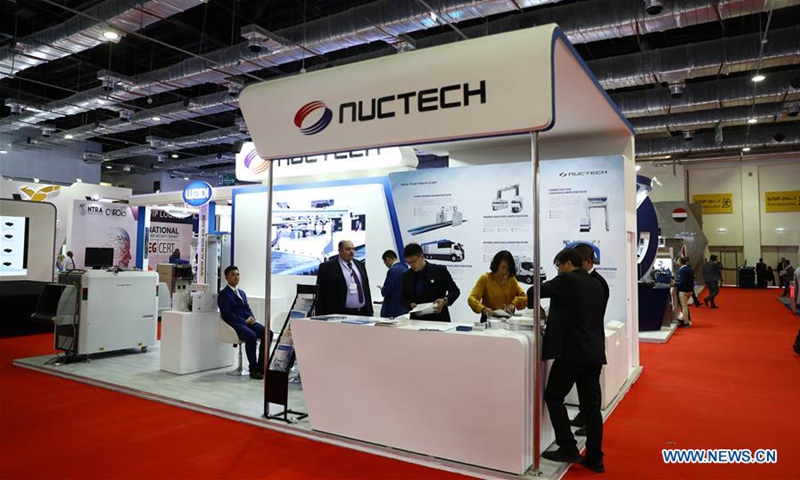
Photo taken on Dec. 1, 2019 shows Nuctech's booth during the 23rd Information and Communications Technology Exhibition and Conference in Cairo, Egypt. Chinese corporations took part in a large information and communications technology exhibition starting from Sunday in Cairo with the participation of around 500 international and local companies. (Xinhua/Ahmed Gomaa)
China's Nuctech on Thursday refuted Lithuanian government's ban on preventing it from supplying baggage-scanning equipment for the country's airports, calling the decision "politically motivated."
According to the Chinese scanning equipment maker, the Lithuanian government's move to ban Nuctech from the tender means it would now go to a US competitor, whose price is higher.
"This implies that not only is this decision politically motivated, but it also distorts competition in the security equipment market to the detriment of the Lithuanian taxpayers," Nuctech told the Global Times in a statement on Thursday.
Citing so called national security concerns, Rasa Jakilaitiene, Lithuanian prime minister's spokeswoman said the government decided the contract with Nuctech does not meet the interests of national security, Reuters reported.
Responding to the allegation, Nuctech said its systems don't even have the capability to collect data, passport information or fingerprints.
"Nuctech will carefully examine the decision and is ready to take all the necessary legal steps to contest it," the company told the Global Times.
It is notable that Lithuania's move comes after US ramped up efforts to ban Chinese technologies, from China's 5G base stations to popular social media apps, citing "national security" concerns. The US ambassador in Vilnius, capital of Lithuania, earlier welcomed reports that Lithuania was considering the ban, local media BNS reported.
Nuctech, a Beijing-based inspection and security solutions and service provider, was put on a blacklist by the US government at the end of last year. It said the listing came as a "surprise," as the company does not have any radiation detection systems in the US and has never had any complaints about the performance of similar solutions in any market that it serves.
Lithuanian government's move is an action of taking side in politics, according to Zhu Xiaozhong, a research fellow at Institute of East European, Russian, and Central Asian Studies, Chinese Academy of Social Sciences.
"By playing hardball with China, its primary purpose is to give in to the US," Zhu told the Global Times on Thursday.
In recent years, Baltic states tend to reinforce "The China Threat."
In its annual report released on Wednesday, the Estonian Foreign Intelligence Service warns China's leadership "has a clear objective of making the world dependent on Chinese technology," mentioning 5G maker Huawei and navigation system BeiDou.
Responding to the report, the spokesperson of Chinese Embassy in Estonia said on Thursday that China expresses its strong dissatisfaction and firm opposition to it, as it is full of hearsay and patchwork, spreading fake news publicly, and misleading the public with ulterior motives.
The attitudes of Baltic states toward China had changed greatly after the former US president Donald Trump took office, according to Zhu. "The report by Estonia is more about political considerations, Zhu noted.
Global Times



